23 Sep 2016 | Events
[vc_row][vc_column][vc_column_text] The award-winning improvised musical Showstopper! has partnered with Index on Censorship to celebrate free expression this autumn.
The award-winning improvised musical Showstopper! has partnered with Index on Censorship to celebrate free expression this autumn.
Offering a brand new, no-holds-barred, spontaneously improvised musical every night, the cast transforms audience suggestions into an all-singing, all-dancing production with unpredictable and hilarious results.
Showstopper! has delighted audiences across the globe, enjoyed nine years as an Edinburgh Fringe must-see phenomenon, a BBC Radio 4 series and a critically acclaimed West End run at London’s Apollo Theatre. In 2016 it won an Olivier Award for Best Entertainment.
In support of Index on Censorship, proceeds from a limited number of special tickets for upcoming performances will go to support our work defending free expression internationally.
★★★★★ “Had me weeping with laughter… you absolutely have to go.” – Mail on Sunday
★★★★★ “Achingly funny… These guys have to be seen to be believed.” – Time Out
★★★★★ “So polished, it defies belief.” – Daily Telegraph
★★★★★ “Joyous, uproarious” – Independent on Sunday
★★★★ “Magical. Properly funny. A triumph.” – The Times[/vc_column_text][/vc_column][/vc_row][vc_row][vc_column][vc_column_text css=”.vc_custom_1480698868177{border-top-width: 2px !important;border-right-width: 2px !important;border-bottom-width: 2px !important;border-left-width: 2px !important;padding-top: 5px !important;padding-right: 5px !important;padding-bottom: 5px !important;padding-left: 5px !important;border-left-color: #0a0202 !important;border-left-style: solid !important;border-right-color: #0a0202 !important;border-right-style: solid !important;border-top-color: #0a0202 !important;border-top-style: solid !important;border-bottom-color: #0a0202 !important;border-bottom-style: solid !important;border-radius: 5px !important;}”]
WHERE: Lyric Theatre, Shaftesbury Avenue, London, W1D 7ES (Map)
WHEN: 12 December – 7:30pm. Running time 90mins plus interval. Age guidance 12+.
TICKETS: £50 (buy yours here). All seats are Band A and half of the proceeds of every ticket sold here will be donated directly to Index on Censorship. You can also book by phone by calling 0330 333 4812 and quoting “INDEX” to the box office.
[/vc_column_text][/vc_column][/vc_row][vc_row][vc_column][vc_column_text]

With special thanks to Divine Chocolate.
[/vc_column_text][/vc_column][/vc_row]
22 Sep 2016 | Events
For the London Press Club’s monthly social evening, Index on Censorship has teamed up with the Frontline Club to present a discussion examining the changing role of the foreign correspondent within a rapidly evolving media landscape.
In the past twenty years budget cuts across the foreign news industry have seen the near-demise of Western foreign correspondents posted abroad. In their place, local-national stringers have become increasingly important providers of foreign news stories. While the nature of conflicts changes and reporting from high-risk zones becomes more dangerous, the traditional model of the foreign correspondent has shifted. The majority of foreign news is no longer gathered by traditional foreign correspondents posted abroad, but by local nationals who were born and raised in the country they report on.
Is the foreign correspondent an endangered species in the news industry? What new models of foreign reporting are emerging alongside new information-gathering technologies? We will be joined by an expert panel to discuss trends in the industry and the future role of the foreign correspondent.
Chair: Rachael Jolley, editor of Index on Censorship magazine.
Speakers:
Kim Sengupta
Defence correspondent at The Independent.
Dr Haider Al Safi
London-based Iraqi journalist and media consultant covering middle eastern politics.
Caroline Lees
Former news and foreign correspondent who has worked as South Asia correspondent for the Sunday Times.
Samira Shackle
London-based freelance journalist who has reported extensively on Pakistan over the last five years
When: 1 November 2016, 7pm
Where: The Frontline Club (map)
Tickets: This is a free ticketed event. Fully booked.
22 Sep 2016 | Awards, Fellowship, Fellowship 2016, Middle East and North Africa, mobile, News and features, Yemen
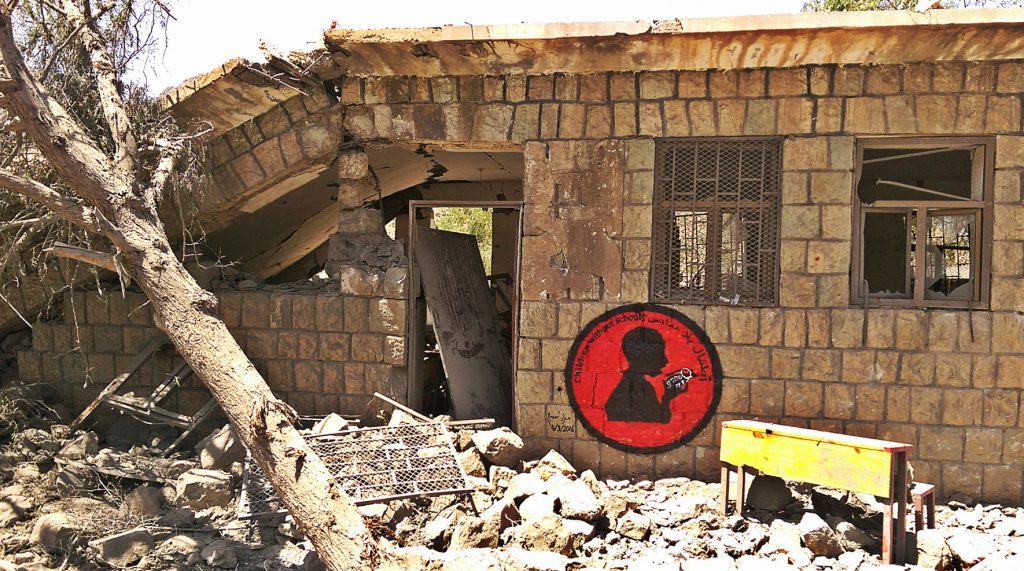
Credit: Ruins campaign. Bani Waleed, September 2016
On 3 September 2016, a group of Houthi rebels convened a meeting at al-Najah School in the al-Haima district of Bani Waleed, a local witness told Murad Subay, street artist and winner of the 2016 Index on Censorship award for arts, that the men entered the school without permission.
“We are not with any of the warring parties – we are caught in the middle,” the witness said.
Soon after, the school was destroyed in an airstrike carried out by the Saudi Arabian-led military coalition, killing one disabled student and adding 1,200 to the more than 3.4 million already forced out of education in the country as over 3,600 schools have been forced to close in the course of the war.
“Can you imagine? These are the soldiers of the wars to come,” Subay told Index. “Without education, these children could become tomorrow’s fighters and tools in the hands of extremists.”
At dawn on 4 September Subay travelled to Bani Waleed to create a mural on what remained of al-Najah.
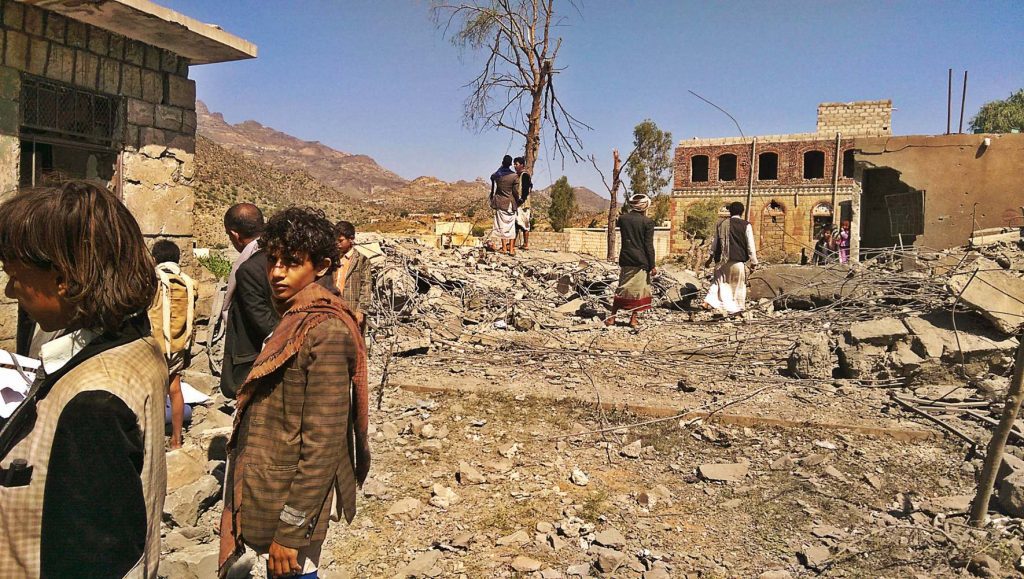
Credit: Ruins campaign. Bani Waleed, September 2016
“When we got there I asked some of the students what they were going to do now that their school was destroyed and some told me they will go to Sanaa while others said they will travel to surrounding villages,” Subay said. “But it will be much more difficult for the 400 girls who attended the school because traditions in Yemen mean they will not be able to travel alone, making it impossible for them to go to other villages to study.”
|
Murad Subay is the 2016 Index on Censorship Freedom of Expression Arts Award-winner and fellow. His practice involves Yemenis in creating murals that protest the country’s civil war. Read more about Subay’s work.
|
|
Destroying schools isn’t a big deal for the warring parties, the artist added. “Some of the children of those leaders who shout ‘death to America’ are studying at the best universities in the world, including in the USA, while each bombed school in Yemen – especially big ones like al-Haima – will take years to rebuild.”
The situation is made even more difficult in a time of war when resources and building materials are almost impossible to come by. “Even if the West stopped supplying weapons to Saudi Arabia today and patted themselves on the back saying ‘we are doing good’, Saudi Arabia already has enough to wage wars for another 150 years if it wants.”
If there is any hope for peace to prevail and schools, hospitals and other buildings belonging to the people are to be rebuilt, countries like Britain and America should take a step further and tell Saudi Arabia “to show restraint”, Subay said.
“While Saudi Arabia is doing the majority of the destruction, all sides of the war in Yemen must take responsibility.”
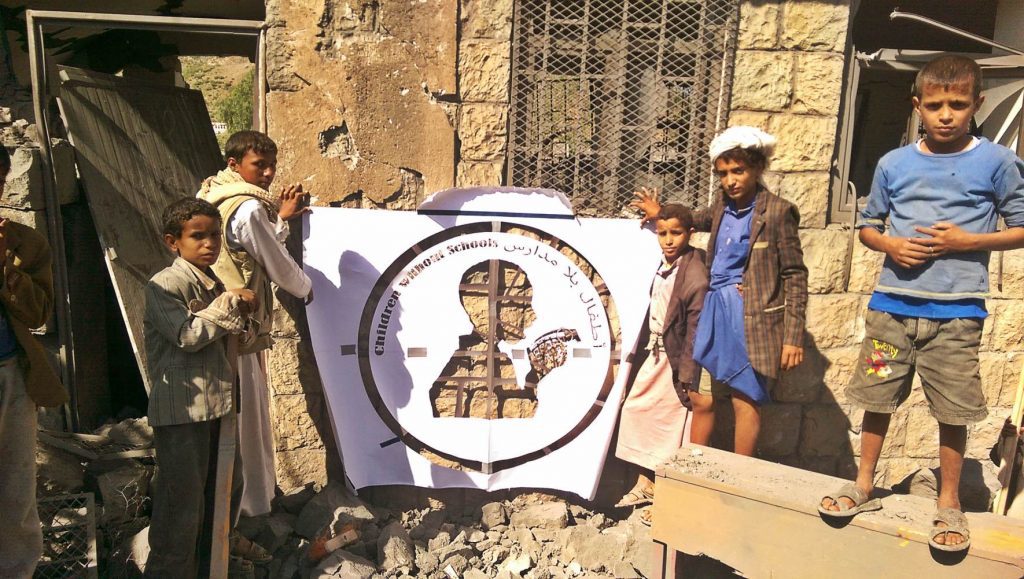
Credit: Ruins campaign. Bani Waleed, September 2016
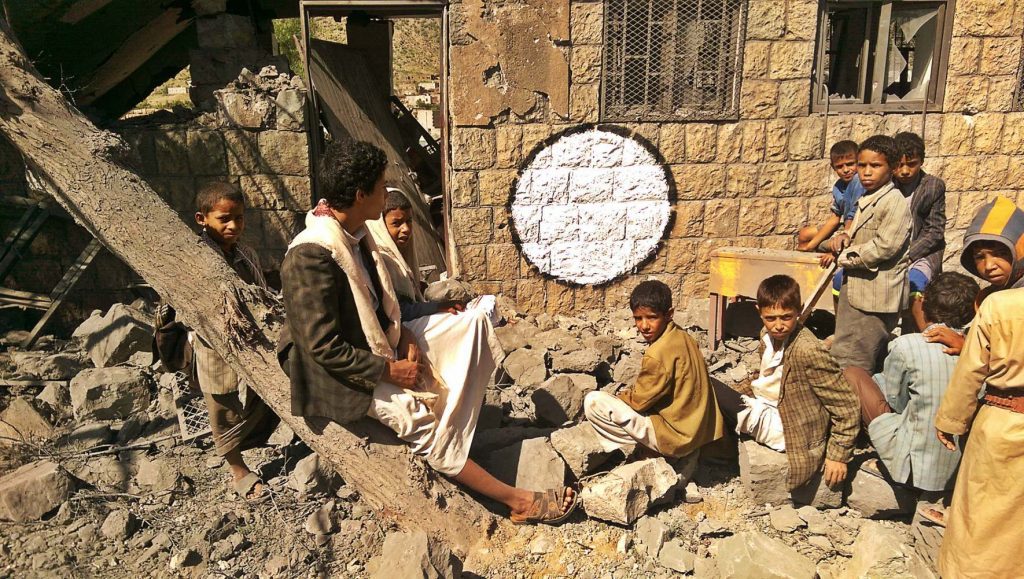
Credit: Ruins campaign. Bani Waleed, September 2016
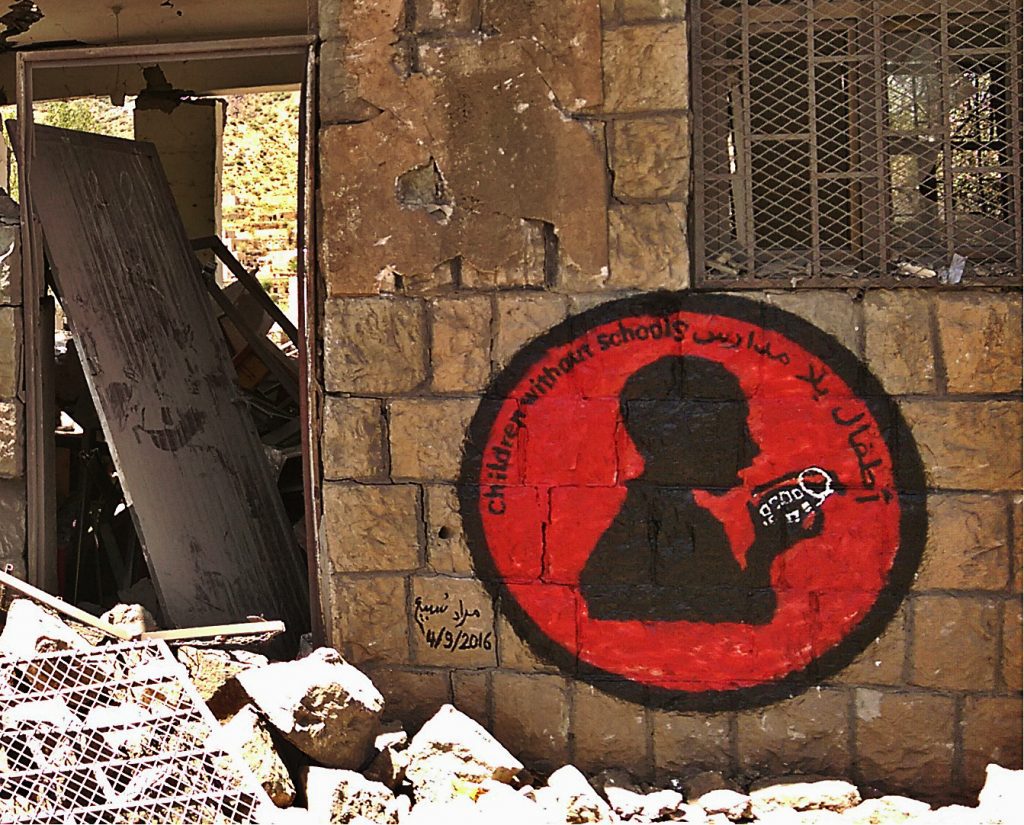
Credit: Ruins campaign. Bani Waleed, September 2016
The mural completed on 4 September depicts a child holding a hand grenade in place of a book, with the words “Children without schools” painted in English and Arabic.
When painting with fellow artists from the Ruins campaign – set up in May 2015 in collaboration with fellow artist Thi Yazen to paint on the walls of buildings damaged by the war – on 25 August, the group were arrested and interrogated by a local militia.
“They asked us to sign a letter with our fingerprints promising that we would not return again without permission,” Subay explains. “I actually did have permission from a local tribal leader but they wouldn’t listen.”
The artists were told if they returned they would be punished.
“My friends were very afraid and some of them said even with permission they would not return,” Subay said. “It was a strange situation for them.”
Subway himself isn’t put off and is already looking forward the next Ruins campaign, wherever that may be.
The last time he spoke with Index, Ruins had just completed a series of murals in front of the Central Bank of Yemen to represent the country’s economic collapse. Soon after the murals were finished, Houthi rebels defaced two out of the three works of art, writing “Samidoon” (صامدون), meaning “steadfast”, which is one of their slogans.
Assessing the situation in Yemen and the many different sides of the conflict, Subay said: “It is very difficult. Every night we hear airstrikes here and there, but we go on with our lives.”
“But any day when I can paint is a good one.”
Nominations are now open for 2017 Index on Censorship Freedom of Expression Awards and will remain open until 11 October. You can make yours here.
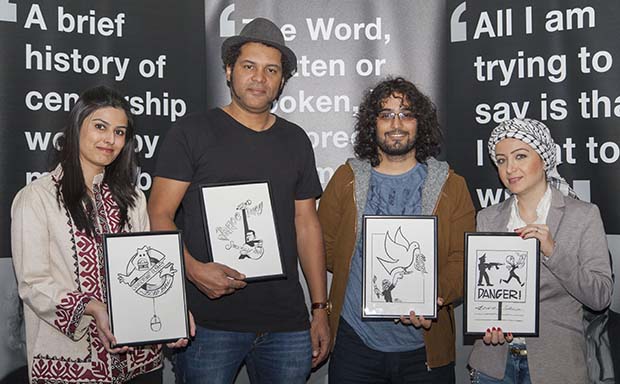
Winners of the 2016 Freedom of Expression Awards: from left, Farieha Aziz of Bolo Bhi (campaigning), Serge Bambara — aka “Smockey” (Music in Exile), Murad Subay (arts), Zaina Erhaim (journalism). GreatFire (digital activism), not pictured, is an anonymous collective. Photo: Sean Gallagher for Index on Censorship
Ryan McChrystal is the assistant online editor at Index on Censorship
21 Sep 2016 | Bahrain, Bahrain News, Middle East and North Africa, mobile, News and features

Bahraini human rights defender Nabeel Rajab (Photo: The Bahrain Institute for Rights and Democracy)
Prince Charles is to make an official visit to Bahrain in November despite the escalating human rights crackdown in the country. This endorsement comes after Queen Elizabeth sat next to the king of Bahrain at her 90th birthday celebrations this summer.
Last week, the UN Human Rights Council commissioner Zeid Ra’ad Al Hussein expressed grave concerns about the country: “The past decade has demonstrated repeatedly and with punishing clarity exactly how disastrous the outcomes can be when a government attempts to smash the voices of its people, instead of serving them.”
Today, Sayed Ahmed Alwadaei, director of advocacy at the Bahrain Institute for Rights and Democracy, told The Times: “The timing of Prince Charles’s visit suggests that the major human rights violations in 2016 are not in the British monarchy’s mind.”
Here are just a few things Index on Censorship would encourage the prince to keep in mind ahead of his trip:
1. The treatment of Nabeel Rajab
Human rights campaigner Nabeel Rajab, who has been arrested multiple times because of his peaceful activism, has been detained since 13 June for comments he made on Twitter. Charges brought against him for his tweets, and even retweets, include spreading “false or malicious news, statements, or rumours”, “offending a foreign country” and “offending a statutory body”.
Rajab was also recently charged with “defaming the state” after a critical op-ed he wrote appeared in The New York Times.
Just last week, the UK government was urged by a group of 50 NGOs to put pressure on Bahrain over Rajab’s treatment. With news of the state-sanctioned Prince Charles visit, it appears these calls have of fallen on deaf ears.
Rajab is expected to be sentenced at his next court hearing on 6 October. He faces more than 15 years in prison.
2. The detention of critics
The Bahraini government has repeatedly used prison as a weapon to silence its critics. Opposition activist Zainab Al-Khawaja was sentenced to three years in prison in December 2014 for “insulting the king” after she ripped up a picture of him. Though she has now been released, her father Abdulhadi Al-Khawaja, a human rights activist and a member of the Bahrain 13, remains in prison along with over 3,500 other prisoners of conscience.
On 22 June 2011 a military court sentenced all members of the Bahrain 13 to between five years and life in prison, on trumped-up charges of attempting to overthrow the regime, “broadcasting false news and rumours” and “inciting demonstrations”. All but two of them remain behind bars.
Last year, the Liberties and Human Rights Department of Al-Wefaq National Islamic Society recorded a total of 1,765 arrests by security services for reasons related to the opposition political movement, including the detention of 120 children and five women.
3. Rendering critics stateless
Another abusive tactic used by the government of Bahrain is to revoke the citizenship of many of its critics. This is illegal under several international agreements, including the Universal Declaration of Human Rights and the International Covenant on Civil and Political Rights. Regardless, 208 Bahrainis were rendered stateless in 2015 alone.
Since amending its citizenship law in 2014, Bahrain’s judges can strip citizenship from anyone convicted under anti-terrorist laws. However, the law does not properly define “terrorism” and several of those subjected to this fate in 2015 were convicted under vague terms such as “inciting and advocating regime change” to “defaming brotherly countries”.
Most of those rendered stateless have been deported, along with their families.
4. Censoring the internet
Named by Reporters Without Borders as an “enemy of the internet“, Bahrain has been busy clamping down on the web over the last few years. Despite being one of the best-connected countries in the world from a technical perspective, Freedom House gives the country an online freedom rating of 72, with 100 being the worst possible score.
News, human rights and opposition websites are routinely blocked, with estimates putting the total number at over 1,000. Social media users have been arrested and had posts forcibly removed, including those of the satirical account @Takrooz whose only post is now: “They tortured me in prison.”
The government is also working on a new Russian-inspired default search engine that would allow it to filter results without the cooperation of Western-based companies such as Netsweeper, which was exposed by the Associated Press as a facilitator of Bahrain’s censorship program.
 The award-winning improvised musical Showstopper! has partnered with Index on Censorship to celebrate free expression this autumn.
The award-winning improvised musical Showstopper! has partnered with Index on Censorship to celebrate free expression this autumn.







